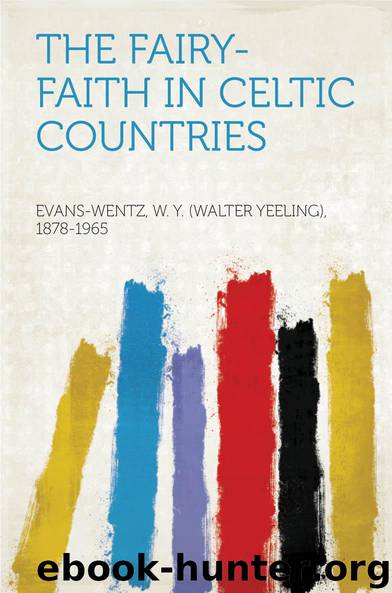The Fairy-Faith in Celtic Countries by Evans-Wentz W. Y. (Walter Yeeling) 1878-1965

Author:Evans-Wentz, W. Y. (Walter Yeeling), 1878-1965 [Evans-Wentz, W. Y. (Walter Yeeling), 1878-1965]
Language: eng
Format: azw3
Published: 2019-06-05T16:00:00+00:00
The Minstrels Or Musicians of the Sidhe
Not only did the fairy-folk of more ancient times enjoy wonderful palaces full of beauty and riches, and a life of eternal youth, but they also had, even as now, minstrelsy and rare music—music to which that of our own world could not be compared at all; for even Patrick himself said that it would equal the very music of heaven if it were not for ‘a twang of the fairy spell that infests it’.[242] And this is how it was that Patrick heard the fairy music:—As he was travelling through Ireland he once sat down on a grassy[Pg 298] knoll, as he often did in the good old Irish way, with Ulidia’s king and nobles and Caeilte also: ‘Nor were they long there before they saw draw near them a scológ or “non-warrior” that wore a fair green mantle having in it a fibula of silver; a shirt of yellow silk next his skin, over and outside that again a tunic of soft satin, and with a timpán (a sort of harp) of the best slung on his back. “Whence comest thou, scológ?” asked the king. “Out of the sídh of the Daghda’s son Bodhb Derg, out of Ireland’s southern part.” “What moved thee out of the south, and who art thou thyself?” “I am Cascorach, son of Cainchinn that is ollave to the Tuatha De Danann, and am myself the makings of an ollave (i. e. an aspirant to the grade). What started me was the design to acquire knowledge, and information, and lore for recital, and the Fianna’s mighty deeds of valour, from Caeilte son of Ronan.” Then he took his timpán and made for them music and minstrelsy, so that he sent them slumbering off to sleep.’ And Cascorach’s music was pleasing to Patrick, who said of it: ‘Good indeed it were, but for a twang of the fairy spell that infests it; barring which nothing could more nearly than it resemble Heaven’s harmony.’[243] And that very night which followed the day on which the ollave to the Tuatha De Danann came to them was the Eve of Samain. There was also another of these fairy timpán-players called ‘the wondrous elfin man’, ‘Aillén mac Midhna of the Tuatha De Danann, that out of sídh Finnachaidh to the northward used to come to Tara: the manner of his coming being with a musical timpán in his hand, the which whenever any heard he would at once sleep. Then, all being lulled thus, out of his mouth Aillén would emit a blast of fire. It was on the solemn Samain-Day (November Day) he came in every year, played his timpán, and to the fairy music that he made all hands would fall asleep. With his breath he used to blow up the flame and so, during a three-and-twenty years’ spell, yearly burnt up Tara with all her gear.’ And it is said that Finn, finally overcoming the magic of Aillén, slew him.[243]
[Pg
Download
This site does not store any files on its server. We only index and link to content provided by other sites. Please contact the content providers to delete copyright contents if any and email us, we'll remove relevant links or contents immediately.
| Fairy Tales | Folklore |
| Mythology |
Circe by Madeline Miller(8120)
Confessions of an Ugly Stepsister by Gregory Maguire(7869)
A Court of Wings and Ruin by Sarah J. Maas(7807)
Burn for You (Slow Burn Book 1) by J.T. Geissinger(7076)
The Bird and the Sword by Amy Harmon(5327)
A Lesson in Thorns (Thornchapel Book 1) by Sierra Simone(5072)
Into the Drowning Deep by Mira Grant(4472)
Stolen (Alpha's Control Book 1) by Addison Cain(4176)
The Queen and the Cure (The Bird and the Sword Chronicles Book 2) by Amy Harmon(4128)
Mythology by Edith Hamilton(3763)
Pernicious Red (When The Wicked Play Book 1) by Natalie Bennett(3509)
Run Little Wolf (The Forest Pack Series Book 1) by G. Bailey(3503)
The Queen and the Cure by Amy Harmon(3301)
(Maiden Lane #5) Lord of Darkness by Elizabeth Hoyt(3073)
Lost Boy by Christina Henry(3009)
Mythos by Stephen Fry(2859)
The Fairy Queen (The Dark Queens Book 6) by Jovee Winters(2804)
Persephone by Kitty Thomas(2697)
Bunny by Mona Awad(2427)
